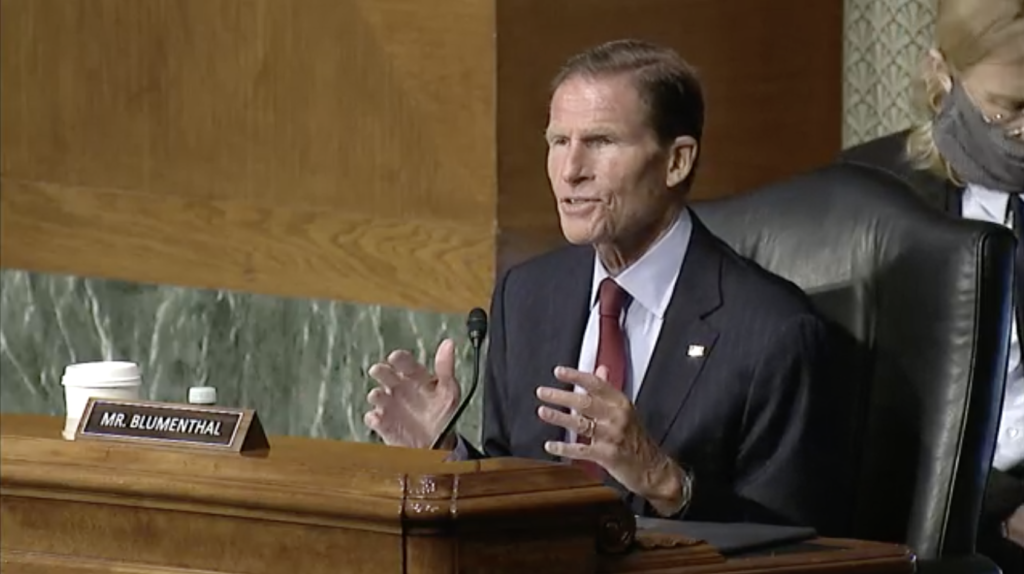Senate Judiciary Passes Open App Act, North Korea Hacked, Ford Pushes Electric Vehicles
Targeting Apple and Google Play stores, bill forbids 50 million+ user marketplaces from requiring developers to use in-app payment options.

February 4, 2022 – The Open App Markets Act passed the Senate Judiciary Committee with near unanimous, bipartisan support.
The bill primarily targeted the Apple and Google Play stores, as it would forbid app stores with more than 50 million domestic users from requiring app developers from using in-app payment options controlled by the application store owner.
The bill also forbade app stores from requiring that developers that utilize in-app purchases have more favorable prices on their app-store as a precondition to allowing said developer from using the marketplace.
Additionally, it would also make it illegal for app stores to take punitive actions against developers for offering different pricing models and terms of service on other platforms, or “unreasonably prefer or rank” its own apps (or the apps of its business partners) over third-party developer apps.
This bill was the second major antitrust bill to pass the Senate Judiciary Committee with widespread bipartisan support in recent months. The American Innovation and Choice Online Act passed by a slimmer margin: Only Sen. John Cornyn, R-Texas, and Sen. Thom Tillis, R-N.C., voted against the Open App Markets Act.
The bill also clarified that the Federal Trade Commission and the Department of Justice would have the jurisdiction to enforce the bill and pursue companies in violation of its provisions.
Lone hacker brings down critical North Korean websites
An American hacker known as P4x (pronounced, “packs”) crippled North Korean broadband infrastructure over the course of two weeks as revenge for attacks he previously personally suffered at the hands of the “Hermit Kingdom,” Wired reported.
P4x’s attacks targeted what few websites the country operated – mainly related to government agencies and state-sponsored travel – and exploited vulnerabilities in their security that made the websites susceptible to distributed denial-of-service attacks. According to Wired, nearly every website based out of North Korea had its service impaired.
The lone wolf hacker decided to take matters into his own hands and launch these attacks on North Korea after the U.S. government refused to retaliate. “If they don’t see we have teeth, it’s just going to keep coming,” P4x told Wired. “I definitely wanted to affect the people as little as possible and the government as much as possible,” he said.
“I just want to prove a point. I want that point to be very squarely proven before I stop,” P4x told Wired.
Ford Motor Company continues to lean into electric vehicles
During its quarterly earnings call on Thursday, Ford announced that it hopes to have 600,000 battery electric vehicles on the road by 2023.
In May of 2021, Ford had announced Ford+, where, among other goals, the company hopes to shift 40 percent of its global vehicles to electric before 2030.
Ford CEO Jim Farley said that the company is “proud that customers see how Ford is taking EVs mainstream, and have already ordered or reserved more than 275,000 all-electric Mustang Mach-E SUVs, F-150 Lightning pickups, and E-Transit commercial vehicles.”
As part of the Ford+ plan, Farley said that the company will continue to deploy its Ford+ Charging software which will provide logistical assistance to commercial fleets of electric vehicles, particularly as companies transition to EVs.
Presumably this software will work in tandem with an additional service Ford advertised, Ford Pro Intelligence – a cloud-based virtual suite that coordinates tools, services, and support offered to commercial Ford customers.
The company also advertised Canopy, a joint venture with ADT Security Services, to improve vehicle security with “artificial intelligence-based camera technology.”








